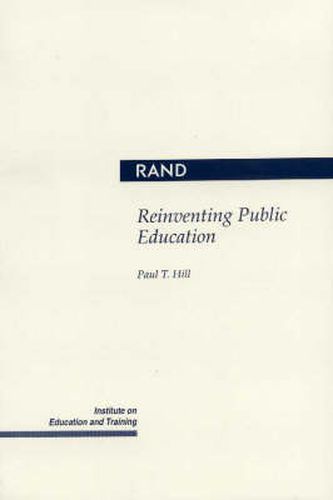Readings Newsletter
Become a Readings Member to make your shopping experience even easier.
Sign in or sign up for free!
You’re not far away from qualifying for FREE standard shipping within Australia
You’ve qualified for FREE standard shipping within Australia
The cart is loading…






American public schools have become government institutions, buffeted by political decisions and hamstrung by regulations. This study sought a practical alternative form of governance for public education, and concludes that such an alternative is possible. Public school contracting allows schools to be operated by a variety of public and private organizations, based on school-specific contracts. These contracts would define each school’s mission and basis for obtaining public funds and establish standards and procedures for accountability. Local public school boards would not operate schools, but would contract with independent organizations to run them. A local board would oversee many different contracts, some for high schools and some for grade schools, some for highly distinctive schools (e.g., Montessori) and others for more conventional schools. Boards would let contracts to expand or reproduce successful schools, and they could close and replace unsuccessful schools. The report suggests ways school contracting can be tested and implemented. (A more current and expanded version of this book is now available from the University of Chicago Press, 1997, ISBN 0-226-33652-2)
$9.00 standard shipping within Australia
FREE standard shipping within Australia for orders over $100.00
Express & International shipping calculated at checkout
Stock availability can be subject to change without notice. We recommend calling the shop or contacting our online team to check availability of low stock items. Please see our Shopping Online page for more details.
American public schools have become government institutions, buffeted by political decisions and hamstrung by regulations. This study sought a practical alternative form of governance for public education, and concludes that such an alternative is possible. Public school contracting allows schools to be operated by a variety of public and private organizations, based on school-specific contracts. These contracts would define each school’s mission and basis for obtaining public funds and establish standards and procedures for accountability. Local public school boards would not operate schools, but would contract with independent organizations to run them. A local board would oversee many different contracts, some for high schools and some for grade schools, some for highly distinctive schools (e.g., Montessori) and others for more conventional schools. Boards would let contracts to expand or reproduce successful schools, and they could close and replace unsuccessful schools. The report suggests ways school contracting can be tested and implemented. (A more current and expanded version of this book is now available from the University of Chicago Press, 1997, ISBN 0-226-33652-2)